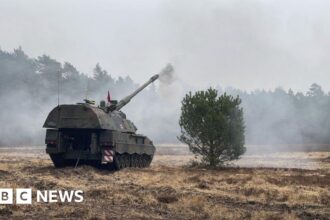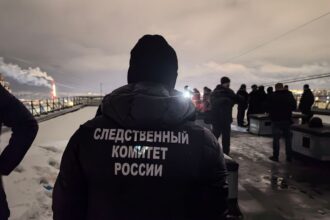A Ukrainian military personnel operates a tank on Aug. 12, 2020, during Russia’s full scale war against Ukraine. (Roman Pilipey/AFP through Getty Images).
Sometimes, it is easy to define victory in war. World War II ended when Allied troops took control of Berlin and Tokyo and the German and Japanese leaders were removed. The Vietnam War ended in a clear loss for the United States. North Vietnam defeated South Vietnam despite the futile sacrifice of 58,000 American soldiers. The Korean War has been called a stalemate, because it never officially ended.
Such definitions are misleading. In Iraq, although the U.S. ousted Saddam Hussein, they did not find weapons of mass destruction to justify their deployment nor did they turn that country into a democracy. Some cynics argue that Iran was the true winner, as it became the most powerful political force in Iraq.
North Korea, on the other hand is a dangerous dictatorship, with a per capita annual income of approximately $1,200, and a recurrent food crisis. Who won the stalemated conflict?
In Ukraine, the definition of success depends on the war aims and the time horizons of the participants. In 2014, Russia invaded Ukraine under the pretext of protecting Russian-speaking Crimea and eastern Donbas. Eight years later, Russia attempted to complete the process of destroying Ukraine as a state.
According to a 2021 letter by Russian President Vladimir Putin, he didn’t regard Ukraine as a separate nation but rather as forming part of broader Russian world. He massed his troops along the border in order to capture Kyiv within a few days, and replace the Ukrainian government. This was similar to what the Soviet Union did in Budapest in 1956 and Prague 1968.
He failed. Volodymyr Zelensky, the Ukrainian president, refused to flee and create a government of exile. Instead, he rallied his troops and saved the capital and derailled Putin’s plans. Zelensky then used the soft power to attract foreign support and increased Ukraine’s military power. Putin’s invasion strengthened Ukraine’s national identity, and NATO, which added two new members – Finland and Sweden – that had previously maintained a policy of neutrality. According to Putin’s original war goals, Ukraine has already achieved victory.
The problem is that Russian troops control about one-fifth (or more) of Ukraine’s land. Putin has changed his war goals and now demands that Ukraine recognizes his annexation four eastern provinces, including some that Russian forces do not fully control. The war appears to be at a standstill, but Putin has changed it into a war based on attrition. Although the Russian casualties have been enormous, Putin may be betting on time, given Russia’s greater population and economy. Ukraine’s willingness to fight and Western support may eventually erode.
According to a recent poll, 26% are open to a diplomatic resolution, but are not willing to engage with sham negotiations, especially with recalcitrant Putin. 86% of Ukrainians think that Russia will attack again, even if the peace treaty is signed. Both Russia and Ukraine have expressed their willingness to negotiate but they are still far apart.
Viktor Orban, Hungary‘s Kremlin friendly prime minister, visited Moscow this past summer to try and mediate but failed to change Putin’s position. Donald Trump claims that he can settle the war within a day, but it’s hard to imagine how he could do that without a Ukrainian surrender.
Petr Pavel, the Czech president and a former NATO General who has been a strong supporter of Ukraine, said recently that “to speak about a victory of Ukraine or Russia will simply not occur.” Pavel said that the end would be somewhere between. He warned that a part of Ukrainian territory would remain under Russian occupation for a period of time, which could mean many years.
If Ukraine defines success as the return of every inch of land that Russia has occupied in Ukraine since 2014, then victory is not within reach. If Ukraine aims to remain independent as a democratic nation linked to Europe while reserving the right to its ultimate return of territory, victory is still possible.
This possible victory means that Putin cannot declare his own win. Ukraine must receive the support needed to improve its bargaining position. Even if Ukraine is unable to achieve its maximumist goals in a short time, its position will remain legitimate as long as Russian gains do not become recognized.
This is sometimes called a Korean solution. International peacekeepers would monitor an armistice along the line-of-control and a demilitarized area, so that Russia could be pushed into a corner if it decided to resume its attacks. It may not be possible at this time to convince 32 NATO members to accept Ukraine’s formal entry into the alliance, but a group of NATO member countries calling themselves “friends” of Ukraine could monitor the area and vow to respond if there is any new Russian aggression.
Ukraine would also require assistance to rebuild its economic system and gain access to EU markets. While a Korean solution may not satisfy Ukraine’s maximumist goals in the near term, it is still a Ukrainian victory.
Editor’s note: Copyright, Project Syndicate. This article was originally published by Project Syndicate in October 8, 2024. It has been republished with permission by the Kyiv Independent.
Joseph S. Nye, Jr., a professor emeritus at Harvard Kennedy School, and a former U.S. Assistant Defense Secretary, is the author “Do Morals matter? Presidents and foreign policy from FDR to Trump (Oxford University Press 2020) and “A Life in the American Century (Polity Press 2024). Read more
Read More @ kyivindependent.com




